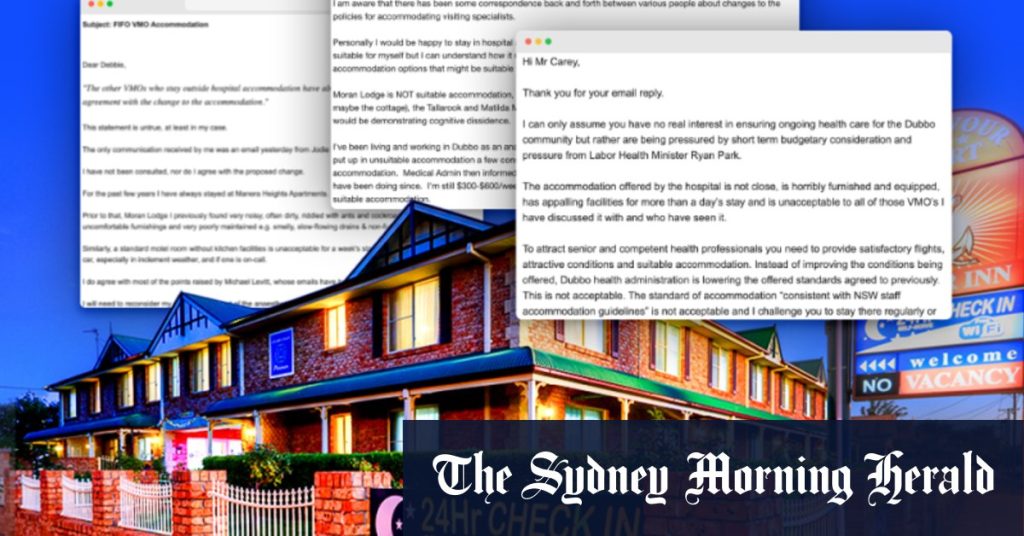Fly-in-fly-out anaesthetists employed at Dubbo Base Hospital are considering boycotting the hospital due to a budget cut on accommodation costs. This cut could potentially disrupt surgeries and services at the hospital, as it heavily relies on a temporary workforce. The Western NSW Local Health District recently informed visiting medical officers that they would only be housed in apartments, units, and a motel owned by the hospital, and the hospital would no longer pay for accommodations of their choice. One of the accommodation options, Endeavour Court Dubbo, is deemed unsuitable for the doctors’ needs.
Doctors have raised concerns over the accommodations provided by the hospital, citing issues such as distance from the hospital, lack of comfortable furniture and crockery, as well as cleanliness complaints. One anaesthetist described the hospital’s accommodation as dirty, riddled with ants and cockroaches, with uncomfortable furnishings, and poorly maintained. They expressed their intention to reconsider their work at the hospital if these changes were enforced. Another doctor mentioned the difficulty of spending days and weeks away from family and expected to be compensated with comfortable accommodations that include facilities such as coffee making, toiletries, and adequate cooking facilities to avoid eating out every night.
In response to the complaints, the hospital’s chief executive, Debbie Bickerton, defended the accommodations, stating that they are up to standard and most VMOs are comfortable with the changes. She addressed specific complaints such as the lack of a coffee table, height of crockery, and limited supply of crockery in the units, deeming the provided accommodations as entirely reasonable. VMOs are private medical specialists who work in hospitals as contractors rather than salaried employees, earning hourly rates ranging from $160 to over $300 for senior staff specialists.
The potential boycott by fly-in-fly-out anaesthetists could have significant impacts on Dubbo Base Hospital, as it heavily relies on a temporary workforce to maintain its services. These anaesthetists play a crucial role in surgeries and procedures at the hospital, and their absence could lead to disruptions and delays in patient care. The hospital’s decision to cut accommodation costs for temporary staff has sparked controversy among the VMOs, who feel that the provided accommodations are not up to their standards and are considering taking action to address their concerns.
The dispute between the hospital and the visiting medical officers highlights the challenges faced by regional hospitals in attracting and retaining temporary medical staff. The accommodation issue is just one example of the broader struggles that these hospitals face in providing adequate resources and support for their workforce. This conflict underscores the importance of addressing the needs and concerns of medical professionals working in regional areas to ensure the continued delivery of quality healthcare services to local communities.
As the situation escalates, it is essential for both the hospital management and visiting medical officers to engage in constructive dialogue to find a resolution that satisfies both parties. Addressing the concerns raised by the VMOs regarding accommodations and working conditions is crucial in maintaining a harmonious relationship and ensuring the continued provision of healthcare services at Dubbo Base Hospital. By working together to find a mutually beneficial solution, both the hospital and the visiting medical officers can contribute to the efficient and effective delivery of healthcare to the local community.













